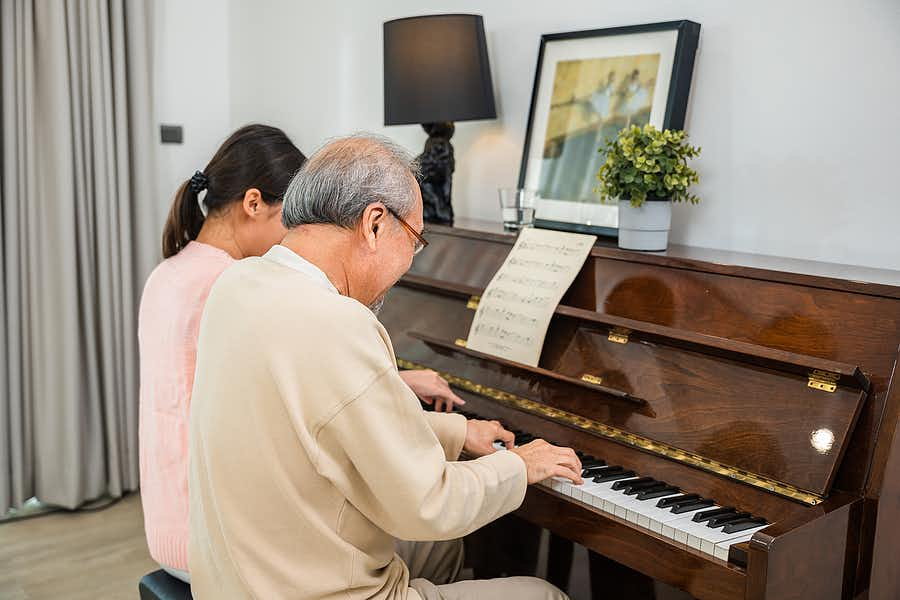
Exercise can make your muscles stronger. Research indicates that people who stay active may also improve their memories. Most of the relevant research considers physical activity such as walking, running, playing tennis or practicing yoga, a new study suggests that playing a musical instrument can also ward off cognitive decline.
Will Music Lessons Help Boost Brain Power?
A new study suggests that learning to play music might help maintain cognitive function as we grow older (International Journal of Geriatric Psychiatry, Feb. 2024). The investigators collected data online from more than a thousand British people over 40. The mean age was 68.
Cognitive scores from people who sang or played an instrument were compared to test results from people who didn’t make music. Those who played a musical instrument demonstrated better memory and problem solving ability. Playing the piano or other keyboard instrument seemed especially helpful. Just listening to music, while pleasurable, did not improve cognitive skills. People who continue to play into older age got extra benefit, according to the scientists.
Fitness Tracking to See Who Improves Their Memories:
A recent study reviewed a year of detailed activity data from 113 Fitbit wearers (Scientific Reports, Aug. 15, 2022). The volunteers also took a set of cognitive tests online to determine how well their memories were working. These participants were adults between 19 and 68 years old. All were fluent in English (and many in another language as well). In addition, all were adept at using the online platform the investigators selected for data collection (Amazon MTurk).
Why Fitbit?
Why would the scientists utilize Fitbit data? This type of data is far more objective than simply asking people about their exercise patterns. After all, many of us kid ourselves about how often and how hard we work out. The Fitbit doesn’t lie about frequency or intensity.
According to the researchers, people who stayed active had better memories. What’s more, people who regularly engaged in intense exercise like running did better on spatial memory problems. They might do a better job of remembering where they parked—or where they left the car keys. The scientists hope to design specific physical activity interventions to help improve memory by leveraging low-cost fitness tracking devices.
Exercise Helps Seniors Improve Their Memories:
This is not the first study to show a link between exercise and cognition. Earlier, investigators found that exercise can help older people improve their memories (Medicine & Science in Sports & Exercise, Jan. 2020).
Adults between 60 and 80 years old pedaled a stationary bicycle at a brisk rate for 20 minutes. Each of the 34 volunteers completed cognitive tests before and after the exercise sessions. The researchers also scanned the volunteers’ brains. They were looking for evidence of any changes these brief bouts of exercise might trigger.
In some individuals, the scans demonstrated greater connections between certain parts of the brain after exercise. These people also got better scores on their memory tests. In particular, people working out at moderate intensity were able to improve their memories. Unfortunately, others did not appear to benefit noticeably.
Consistent Training Also Helped Older People Improve Their Memories:
A follow-up on the study looked at how well people fared on cognitive tests after 12 weeks of consistent training. Those who did well after a single exercise session also seem to improve their memories and their brain connections following months of exercise.
The investigators point out that the benefits from exercise show up quickly, but they also fade unless a person continues to exercise. Next, they will try to figure out why some people didn’t seem to get much brain boost from physical activity.
Learn More:
If you want to harness the power of exercise to improve your cognitive function, you may want to try these ideas for getting motivated and following through. You may also want to listen to our interview with Dr. Wendy Suzuki on how to make your brain healthy through exercise. It is Show 1040. We spoke with Dr. Jordan Metzl on how to find time to exercise in Show 1106. Also of interest, potentially, is Show 1090: How Intense Exercise Benefits Parkinson’s Patients.
Citations
- Vetere G et al, "The relationship between playing musical instruments and cognitive trajectories: Analysis from a UK ageing cohort." International Journal of Geriatric Psychiatry, Feb. 2024. DOI: 10.1002/gps.6061
- Manning JR et al, "Fitness tracking reveals task-specific associations between memory, mental health, and physical activity." Scientific Reports, Aug. 15, 2022. DOI: 10.1038/s41598-022-17781-0
- Voss MW et al, "Acute exercise effects predict training change in cognition and connectivity." Medicine & Science in Sports & Exercise, Jan. 2020. doi: 10.1249/MSS.0000000000002115

